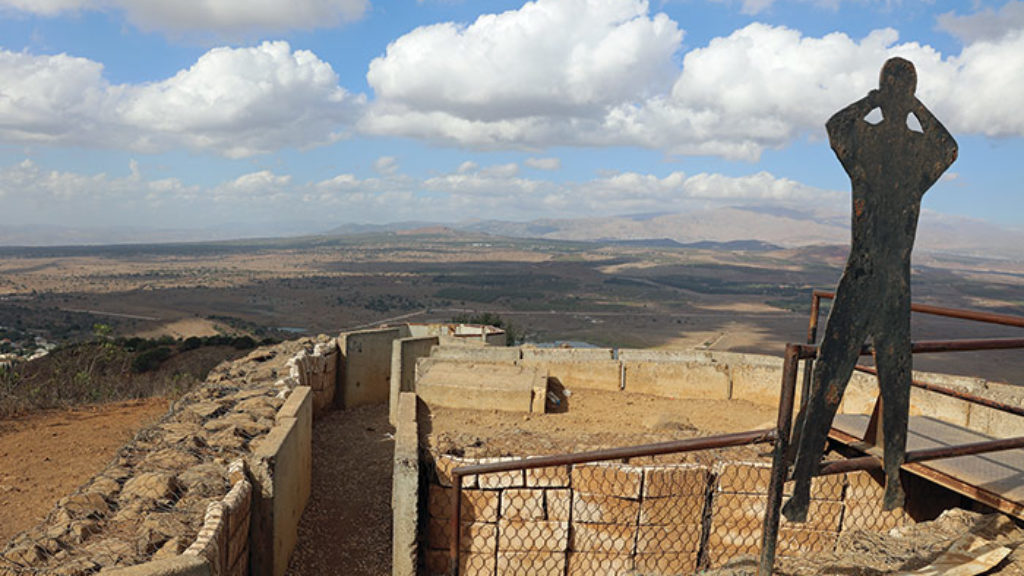Letters, Spring 2024
JRB, Don’t You Wonder?
Thank you for a stunning, thought-provoking, deeply moving, and utterly necessary issue (Winter 2024), from Neta Stahl’s Agnon-influenced memoir of growing up on Kfar Aza (“A Kibbutz and Its Fullness”), through the eloquent responses to October 7 (“Before & After October 7: A Symposium”), to Dan Alter’s re-translation of Yehuda Halevi’s poem about Zion and its captives, “Oh Homeland, Don’t You Wonder.”
Talia Cohen
Montreal, Canada
Good News from Sa’ad
I grew up in Kibbutz Sa’ad in the Negev, and I would like to make a correction to Matti Friedman’s excellent article (“Readjusting Sights,” Winter 2024). Indeed, a tank did show up miraculously on October 7 and saved Sa’ad from the terrorist attack. Friedman heard that the tank’s crew didn’t survive. I’m happy to include a picture of the four soldiers who came to visit the kibbutz they had saved.
Rabbi Niema Hirsch
Congregation Rodeph Sholom Bridgeport, CT
Matti Friedman Responds:
In almost thirty years of journalism, I believe this is the first time I’ve been happy to get a correction. Good news is certainly in short supply these days, so a special thanks to Rabbi Hirsch for letting me, and readers of my reconsideration of Haim Sabato’s Adjusting Sights, know about the true fate of this heroic crew.
Anti-Israelism or Antisemitism?
I appreciated the three related articles in the Win- ter 2024 issue by Jonathan Karp, Reviel Netz, and Abraham Socher (“Anti-Israelism,” “Of ‘Good Jews’ and Bad Binaries,” and “An Old-New Bigotry? A Response”) about whether anti-Israelism is something new and different from either antisemitism or anti-Zionism. Although I was skeptical, I came away thinking that Karp and Netz might be on to something, despite Socher’s probably correct questioning about how new this really is.
Semantically, anti-Israelism takes into its orbit of hate its many non-Jewish citizens, so in that sense it is broader and actually worse, even if it applies to fewer souls (say nine million rather than, in the case of antisemitism, sixteen million). Another helpful result of identifying this old-new bigotry is it helps us understand the ignorant, who simply don’t know that their animus toward what they think is a colonialist oppressor state actually constitutes Jew hatred in another form.
The result of great writing is to stimulate the mind, so I will continue to reflect on these essays and think about this newly defined version of a very old disease. Whatever we call it, and however they can be distinguished, these three terms, all of them, are simply manifestations of Jew hatred.
Andrew O. Smith
Columbus, OH
Jonathan Karp (“Anti-Israelism,” Winter 2024) claims that “The accusation of Israeli apartheid . . . is unfortunately plausible with regard to Israel’s treatment of Palestinians in the occupied West Bank.” He is mistaken. The system of governance in Judea-Samaria to which Israel and the Palestinian Authority (PA) agreed, in the Oslo Accords, stipulates that Israel’s laws apply to the 60 percent of the territory which Israel governs and where Israelis reside, and the PA applies its laws to the 40 percent that it governs, where 98 percent of the Palestinian Arabs live. That’s not apartheid; that’s an agreed-upon division of rights and responsibilities.
Israel’s laws in those territories are not based on race, which is the essence of apartheid; they are based on citizenship. They apply equally to Israeli citizens of all colors—White, Black, and in between; Jew, Christian, and Muslim. Israeli citizens vote in Israeli elections. The Palestinian Arab residents of the territories are not Israeli citizens, so they vote in the Palestinian Authority’s elections—when the PA allows them. The only policies resembling apartheid in that region are the PA’s refusal to permit Jews to live anywhere in its territory and its law mandating the death penalty for Arabs who sell land to Jews.
Moshe Phillips
Philadelphia, PA
I was so impressed by Reviel Netz’s article “Of ‘Good Jews’ and Bad Binaries” (Winter 2024) that I took the uncharacteristic step of sending this letter.
Of course, October 7 was a bouleversement of my world along with everyone else’s. I had always resist- ed the understanding of antisemitism as universal, secure in my knowledge here in America that “this time it’s different.” When I rudely woke up to the fact that the differences had evanesced, I went back to the old vocabulary. “It’s rank antisemitism, pure and simple,” became my new mantra. But Netz’s article opened a different vista. Applying Mary Douglas’s anthropological insight about disgust to this phenomenon hits the nail on the head. It takes the “narcissism of small differences” and puts it on steroids, perhaps explaining the blind fury we now see everywhere to extirpate the disgusting excrescence that can never be integrated into the body politic.
And yet, anti-Israelism seems to be less than the whole story. I was just sent an image today as part of a group of UCLA Jewish faculty. It is a tweet from UCSF Dr. Rupa Marya asking for examination of the “presence of Zionism in US medicine . . . as a structural impediment to health equity.” She helpfully adds: “Zionism is a supremacist, racist ideology and we see Zionist doctors justifying the genocide of Pal- estinians.” Is hers truly only a virulent anti-Israelism? Could it be solved in her eyes by Jewish colleagues’ “continuously reaffirm[ing] their anti-Zionism” (to use Netz’s ironic phraseology)? Or is it deeper, an implacable hatred that is simply a recrudescence of what Abraham Socher (“An Old-New Bigotry? A Response”) calls the old-new antisemitism?
I am still integrating Netz’s new way of thinking. It strikes me as powerful but not yet the complete answer.
David Nimmer
Los Angeles, CA
In his excellent article “Of ‘Good Jews’ and Bad Binaries,” in the Winter 2024 Jewish Review of Books, Reviel Netz suggests that it is because Jews are considered by antisemites to be “out of place” that anti- semites consider them to be disgusting. He draws on the Bible’s prohibition of the consumption of certain animals and Mary Douglas’s theory that whatever is out of place is disgusting because being out of place makes it dirty. I would argue that a closer analysis of the biblical opposition to the consumption of pigs provides a deeper explanation for antisemitism.
Pigs are not out of place from a kashrut perspective because they have cloven hoofs like kosher ani- mals; they are invalidated because they do not chew their cud. However, the Bible emphasizes that the consumption of pigs is prohibited because their cloven hoofs misleadingly makes them appear to not be out of place: “And the swine—although it has true hoofs, with the hoofs cleft through, it does not chew the cud: it is impure for you.” (Lev. 11:7)
The cause of antisemitism echoes this reason. What antisemites typically found most offensive about Jews is that they were able to hide their otherness. Though Douglas eventually gave up the “out of place” explanation in its simplest form, it continues to be a valid explanation for antisemitism.
Gershon Hepner
Los Angeles, CA
One Thousand Enter and One Emerges
Cole S. Aronson’s interesting discussion of the post– October 7 trickle of haredi enlistments in the IDF (“Black Hats, Green Fatigues,” Winter 2024) does not come to grips with the scope of the problem. What was originally intended as a way of enabling a handful of qualified scholars to avoid army service in order to learn Torah has become a massive fraud whereby hundreds of thousands of indolent young men claim to learn Torah in order to avoid army service. The very idea that every male child born under the umbra of a black Borsalino is cut out for a life of full-time Talmud study is as absurd as arguing that every child born within a mile radius of Lincoln Center is cut out to be a concert violinist.
Back in the Talmudic era, it was known that “elef nichnas v’echad yotzei”—of every thousand who enter the yeshiva perhaps one worthy scholar will emerge. Today it’s more like ten thousand for one. Serious Torah study requires both a razor-keen mind and an extremely well-padded posterior (zitzfleisch, lit: seat meat). That crime of over 160,000 haredis evading service is compounded by the billions they are drain- ing from the taxpayers’ pocket in order to subsidize their indolence. And all this because of the inherent corruption of coalition horse-trading, whereby an unscrupulous and totally secular political leader will sell both the public interest and national security in order to retain the semblance of power.
J. J. Gross via jewishreviewofbooks.com
Understandable Trauma?
I was interested to read the responses to October 7 in the latest issue of the Jewish Review of Books (Winter 2024), which testify to the extreme fear and anxiety that the Hamas massacre has sparked in Jews of all political persuasions. The reasons aren’t difficult to comprehend. When I visited Auschwitz in September, I was overcome with a sense of dread as I walked along the Birkenau railroad tracks, half expecting the passing of a train headed toward the crematorium. The problem is that the understand- able trauma hardwired into our psyches too often brings with it emotions detrimental to an appropriate response to crises: paranoia, self-absorption, and an overblown sense of victimhood that excludes recognition of the sufferings of others.
There has been much talk of late about the precip- itous rise of antisemitism in this country. I’ve carefully examined the alarming figures put out by groups such as the Anti-Defamation League and the Amerian Jewish Committee and have concluded that the great majority of them reveal anti–Gazan War or anti-Zionist rather than antisemitic sentiments.
Anthony Julius (“Before & After October 7: A Symposium”) concedes there is a distinction be- tween the two viewpoints but sees both as “similarly dangerous” ideologies that “threaten Jewish life.” But is that really the case? Instead of being seen as “polluted” by cosmopolitanism or antisemitism, why can’t anti-Zionism be understood as yet an- other way of thinking about the relationship of Jews to an ethnic nationalist regime and to a non-Jewish peoples who share their land and history?
Growing up in Crown Heights, Brooklyn, in the 1940s and 1950s, I had as a neighbor Rebbe Menachem Schneerson, who enthusiastically em- braced the State of Israel and ensured a place for the Lubavitcher Hasidim in the Zionist fold. But a few miles away in Williamsburg, the Satmar Hasidim remained staunchly anti-Zionist, believing that Jews are forbidden to establish a sovereign state in the Land of Israel until the arrival of the Messiah. To this day, they regularly appear at pro-Palestinian rallies. Are these strict adherents to Orthodox Jewry to be condemned for having an antisemitic ideology?
And is the distinguished Israeli philosopher and theologian Yeshayahu Leibowitz, an Orthodox Jew and a Zionist, to be likewise branded an antisemite for his virulent criticisms of Israel’s policies toward the Palestinians? Leibowitz urged Israel’s withdrawal from the territories it had seized in 1967, drawing a bleak picture of what he saw as the inevitable consequences of a prolonged occupation: Israel’s development into a colonial state administered by an increasingly authoritarian political regime, sparking insurgency in a radicalized dominated population, which would then be subject to increasingly violent and ruthless suppression.
The 1982 war in Lebanon intensified Leibowitz’s chillingly prophetic view and prompted his call for Israeli soldiers to refuse to serve in the occupied territories lest they turn into what he termed “Judeo-Nazis.” It need hardly be pointed out how appalled yet unsurprised he would be by the current situation in Gaza were he alive today and forced to confront the realization of his worst nightmare: the mutual corruption of both rulers and ruled, resulting in the atrocities of October 7 and the war crimes in Gaza in the months since then.
What did I believe before October 7 that I no longer believe? That when Jews say “never again” they mean it as an absolute without exception since they know from their own history what the “again” looks like, hence know how intolerable and scandalous it would be if Jews themselves were in any way complicit in its recurrence.
Carole Fabricant
Emerita Professor of English University of California, Riverside
Abraham Socher Responds:
I am grateful to all those who wrote to us about our Winter 2024 issue and regret that we could not pub- lish more of their letters. However, I do feel that I should respond to Professor Fabricant, who I think is too quick to ascribe the newfound (or at least renewed) worries of Jews like me, Anthony Julius, and many others to understandable old trauma and lamentable neurosis (“paranoia, self-absorption, and an overblown sense of victimhood”). What we regard as antisemitism, or at least a dangerous variant (see the letters above and the essays that occasioned them), is, according to Fabricant, merely, or largely, justified protest against the war crimes of the IDF in Gaza. I would ask Fabricant three questions: What about the anti-Israel protests that justified Hamas’s massacre as resistance and preceded Israel’s military response to the Hamas massacre at, say, Harvard, Columbia, and, not least, the University of California? To bring it even closer to home, how would she describe the (minor but malicious) vandalization of Hillel offices at the University of California, Riverside last November? And what do these and a thousand other instances of Jews being attacked, harassed, and shunned really have to do with Leibowitz’s theologically austere Zionism or Reb Yoelish’s baroque anti-Zionism?
Like every decent person, I mourn the death of every innocent under the lead skies of Gaza, but it is obscene to compare the present war to the Holocaust.
Comments
You must log in to comment Log In
Suggested Reading

The Mabam Strategy: Israel, Iran, Syria (and Russia)
In 2017, Israeli fighter jets hit an Iranian weapons facility in Syria, and such strikes have continued over the last 18 months. But as Assad solidifies his victory in the Syrian civil war while Iranian and Russian forces remain on the ground, the next Israeli government must rethink its strategy in “the campaign between the wars,” known in Hebrew as mabam.
Biography of the Jewish Bible
An interview with David Stern on the many physical forms of the Jewish Bible, from parchment scroll to electronic tablet.

Revisiting Hill 24
The first movie I ever saw, not counting Dumbo, was Hill 24 Doesn’t Answer, a landmark black-and-white film about Israel’s War of Independence . . .
What They Talk About When They Talk About Golems
On golems and global conspiracy theories.


mike frank
An agonized footnote to a tiny parenthesis in Jonathan Karp's acute and remarkably vivid mapping of the forces at work in the current situation. Speaking of diaspora Judaism, Karp writes: "Jews could be blissfully free of responsibility for the bad things that states (all states) do " If indeed "all states" do bad things, then we no longer have the moral high ground. The nastiness of realpolitik may be inescapable for a nation state, but I trust I'm not "romanticizing . . . powerlessness" if I say that, lacking the moral high ground, I do not know where to stand.
JJ Gross
Carole Fabricant is way off the mark when she labels Chabad as Zionist, and paints all of Satmar as anti-Israel demonstrators. Chabad is not now, and never was, Zionist; quite the opposite. However, where the late Rebbe. Menachem Mendel Schneerson parted company with his predecessors is that he ceased to be anti-Zionist and allowed his overwhelming love for every Jew to include, perhaps especially, those living in and protecting Israel. As for Satmar, their opposition to Zionism notwithstanding, it is not they who march with Palestinians wearing keffiyeh stoles. Those miscreants are a noisy fringe group called Neturei Karta, who resemble Satmar but march to a far more virulent drummer.